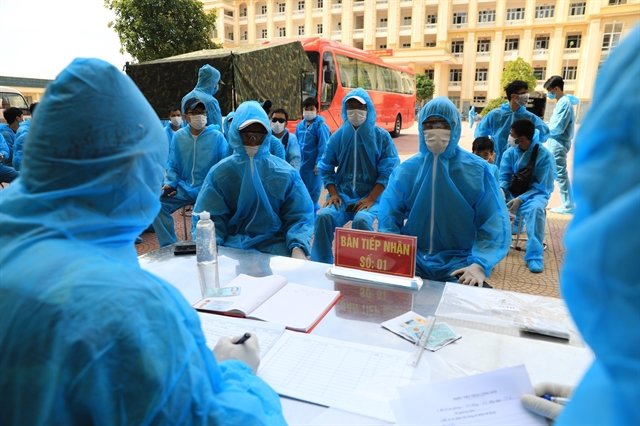.jfif) Opinion
Opinion

Trần Như Dương, Deputy Director of the National Institute of Hygiene and Epidemiology, and deputy head of the standing unit on COVID-19 in Đà Nẵng, Việt Nam’s coronavirus epicentre, talks to Vietnam News Agency on the critical role of contact tracing and surveillance in suppressing COVID-19.

|
| Tourists stranded in Đà Nẵng City, Việt Nam's current and largest COVID-19 epicentre, were sent to a military camp upon returning to Hà Nội on a specially arranged flight on August 12, 2020. — VNA/VNS Photo Thành Đạt |
Trần Như Dương, Deputy Director of the National Institute of Hygiene and Epidemiology, and deputy head of the standing unit on COVID-19 in Đà Nẵng, Việt Nam’s coronavirus epicentre, talks to Vietnam News Agency on the critical role of contact tracing and surveillance in suppressing COVID-19.
As an epidemiologist that has been to many COVID-19 outbreaks in Việt Nam since the beginning of the pandemic, what do you consider the most important measures in preventing outbreaks?
As we all know, there is currently no effective treatment plan nor a vaccine for COVID-19. The most important method we have right now to fight the pandemic is to break the chains of transmission, which involves isolating the source of infections and preventing the source from spreading the virus into the community.
This is the foundation of the forced quarantining of all contacts to confirmed COVID-19 patients or suspected patients. Regarding the close contacts of a patient, referred to as F1 cases, the Việt Nam’s Ministry of Health said these people warrant special attention.
F1 are those who have had contact with the confirmed or suspected COVID-19 patients within two metres, no matter for how long, and the health ministry regards these people as probable COVID-19 patients given the exposure.
The identification of these F1 cases, carried out immediately when a patient is confirmed positive for the SARS-CoV-2 virus or suspected to be positive, is the key factor in fighting the pandemic.
Our current strategy is community-based, involving identification and isolation. Early detection of cases is possible via surveillance and testing.
Across the country, the principle stays the same – “swiftly and comprehensively tracing contacts,” meaning that we have to carry out the tracing as fast as possible while making sure that all F1 cases are discovered.
If we somehow fail to isolate the F1 cases from the community, these cases – again, I have to reiterated that these are highly probable virus carriers – will infect others.
The infections start first with their family, and then their workplace, community and then other large crowds, making it difficult to contain the outbreaks.
Can we allow these F1 cases to self-isolate at home?
The health ministry is clear that these F1 cases are not to be isolated at home, but to be forced into mandatory centralised quarantine facilities managed by the Government.
Home isolation is not easily monitored, just a small breach – say, leaving home anytime during the isolation period – would result in the virus “infiltrating” the community.
Aware of the strict management of F1 cases, the health ministry requires, in this time, that all these cases be sent to centralised quarantine facilities under the supervision of health workers.
What are your recommendations for management of F1 cases in centralised quarantine facilities?
The health ministry has issued detailed guidelines on centralised quarantine operations, including instructions for the managers, staff and quarantined people as well, to prevent cross infections in these quarantine camps.
Since F1 cases are placed under supervision here, the risks of virus transmission are considered elevated, everything from arranging rooms and daily activities need to be done right.
All people inside the facilities – from the quarantined to the supporting staff – must follow the guidelines to avoid risks of cross infections.
The quarantined person should stay inside their rooms, refrain from going outside, meeting or talking with other people, and especially avoid large gatherings.
As someone who has braved the country’s COVID-19 outbreaks, what message do you want to convey to the public?
Our Government’s motto is “fighting the pandemic like fighting the enemies.” This is an all-people war, not a war of the health sector’s or the government’s alone, a war in which, “every household is a fortress, each person a soldier."
In this fight against the virus, we need a buy-in from the entire population. Everyone must participate and contribute their efforts to repel the pandemic.
Everyone must exercise their civic duties to the entire society, one for all and all for one, only through this coordinated efforts can we gather enough strength to defeat COVID-19.
Everyone should abide with health guidelines – wearing masks in public, frequently washing or disinfecting hands, keeping a distance, and declaring health status, etc.
The F1 cases need to strictly observe the rules in quarantine facilities, this is not just a civic duty but it’s also in their best interests.
The interests are that they get medically examined routinely, and quick access to proper medical attention if they fall ill, and their health and life are protected. The duty part is that they have a responsibility to avoid infecting others and the community at large. — VNS




